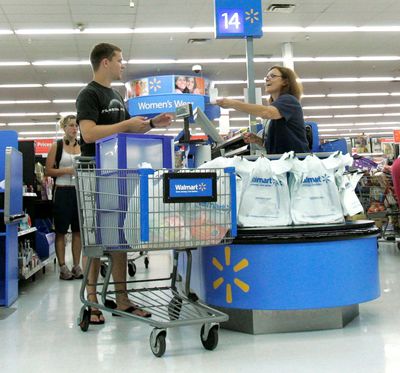Consumer spending decreased in July
Retail sales, foreclosures show economic pressures taking toll

WASHINGTON – Retail sales dipped last month, while foreclosure filings soared, signaling that the economic pressures facing households have not let up even as the recession appears to be easing.
Retail sales fell more than expected in July, down 0.1 percent, the Commerce Department reported Thursday, as caution among consumers overcame any boost provided by the popular “cash for clunkers” program. Gasoline sales also dragged down the results. The average price of a gallon of fuel dropped to $2.53 in July from $2.64 in June, sending gas station sales down 2.1 percent.
The drop in retail sales followed an increase in June.
“July’s retail sales provide very little evidence that household spending is ‘stabilizing,’ ” Capital Economics U.S. economist Paul Dales said Thursday in a research note. “In fact, they show that falling employment, slowing wage growth and a limited access to credit are still taking their toll on spending.”
The data contributed to a volatile day of trading on Wall Street. U.S. stock markets closed up as investors chose to focus on upbeat comments about the economy made by Federal Reserve leaders on Wednesday. They also announced they would wrap up planned purchases of government debt by the end of October that, along with purchases of mortgage-related securities, were intended to help slow the economy’s slide. The blue-chip Dow Jones industrial average closed up 0.39 percent, or 36.58 points, to 9398.19.
Cash for clunkers, the federal program that allows consumers to trade in their older vehicles for credit toward the purchase of a new car, helped push auto sales up 2.4 percent, the retail sales report shows. Consumers were hesitant, however, to pull the trigger on other major purchases. July sales at furniture and home furnishings stores were down 0.9 percent from June, while electronics and appliance stores dropped 1.4 percent. Building materials, garden and supply stores saw the biggest loss at 2.1 percent.
Even discount retailing behemoth Wal-Mart reported that sales at U.S. stores open at least a year – a key measure of health in retailing – fell 1.2 percent in the second quarter. The company’s profits were flat compared with a year earlier.
Consumer spending accounts for about 70 percent of the nation’s economic output and in the past has helped bring the country out of recession. But rising unemployment could constrain spending and slow growth, economists said.
Foreclosure filings have kept climbing even though the Obama administration has tried to limit them through its Making Home Affordable program that seeks to help buyers.
At the end of June, about one-third of borrowers, or 15.2 million mortgages, were “underwater” with the homeowner owing more than the home was worth, according to a report issued Thursday by First American CoreLogic, which studies the mortgage market.